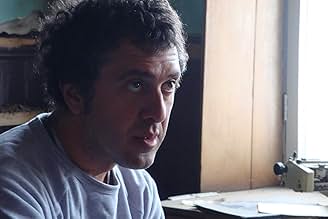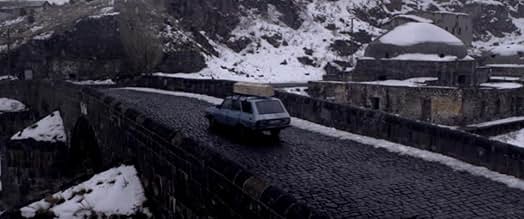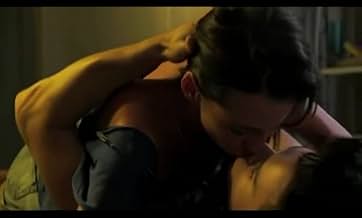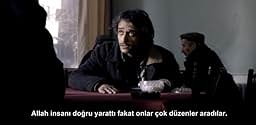Kosmos
- 2009
- 2h 2min
Aggiungi una trama nella tua linguaA strange man with otherworldly talents becomes both a friend and a pariah in a small Turkish town in this drama from writer and director Reha Erdem. Yahya is nearly in a panic when his youn... Leggi tuttoA strange man with otherworldly talents becomes both a friend and a pariah in a small Turkish town in this drama from writer and director Reha Erdem. Yahya is nearly in a panic when his young son falls into the river on a wintry day and looks lifeless when he's pulled from the wa... Leggi tuttoA strange man with otherworldly talents becomes both a friend and a pariah in a small Turkish town in this drama from writer and director Reha Erdem. Yahya is nearly in a panic when his young son falls into the river on a wintry day and looks lifeless when he's pulled from the water.
- Regia
- Sceneggiatura
- Star
- Premi
- 16 vittorie e 10 candidature totali
Recensioni in evidenza
But all of these positive aspects are lost when the plot starts to unravel -- to say more clearly it doesn't unravel because there is no plot for the audience to follow. The audience are expected to be satisfied with bits and pieces of characters, events and visuals (like running goose, cows being slaughtered) that are thrown at them and after a solid 2 hours you are left wondering who did what why and what was it all about.
Now I am aware that Reha Erdem is a talented director and I like a surreal movie as well as the next guy, but unless you are sure you are ready to be compared with really masterful movie/directors like Yavuz Turgul (Gölge Oyunu) or lets also give an example of Lynch, one should stick with solid plots.
As a last note, seriously Mr.Erdem, what was with all the religious mambo-jumbo voiced by Kosmos character. All were alienating moments when he spoke - and no, it wasn't even a good alienation.
Reha Erdem's Kosmos is a rare film that exhilarates the spirit. Unclassifiable, it's best placed in one of those niches set aside for oddball jewels. Not a perfectly cut diamond – it digresses here and there and could be slightly trimmed – but a highly polished one nevertheless. Its hero Battal, who calls himself Kosmos, is brilliantly brought to life by Sermet Yesil. Yesil crafts him into one of the strangest and most endearing characters to emerge out of recent cinematic history. Quirky and intense, with a sub-layer of sadness that seems to reflect the suffering of the world.
The film begins with his dramatic entry into the Turkish city of Kars, in eastern Anatolia, near the Armenian border. Erdem takes his time with the opening scenes: gripping and feverish, against a palette of sounds and snowscapes, they set the film's tone and prefigure its ending. Battal is a distant figure engulfed by a wintry landscape, running fearfully from unseen pursuers as he downs a snow-covered hill towards the river that runs through the city. He hears a young woman calling for help as she runs along the bank after the body of her brother, floating downstream in rushing water. After hiding a wad of bills (stolen?) under a rock, Battal pulls the child out of the water. In a wild frenzy of hugs, cries and rolling about, her brother is resuscitated. The beautiful young woman (Türkü Turan), who claims the boy was dead, finds instant affinity with Battal, and decides to call herself Neptune.
Battal is then received as a hero by the locals and the neighborhood café owner offers him room and board for the menial job of clearing tables. The film recounts the events that occur as he shirks the job, steals money (which he mostly gives away) and roams the city, trying to alleviate the suffering of his fellows.
It is soon clear that this stranger is a man of uncanny powers and otherworldly connections. Drawing his febrile energy from no more than sugar lumps and tea, he shimmies up trees like a feline and emits birdsong as he leaps, swings or flies (we never really see) from branch to branch. In one shrilling, virtuoso scene with Neptune, we get a flashing glimpse of his (their?) feet turned into those of a bird and of Battal walking upside down across a ceiling.
His presence deregulates clocks, he claims to have been to Alpha Centauri and he has the power to heal, though not infallibly. A child he cures of muteness falls ill and dies, and the brittle school teacher he beds and cures of migraines jumps to her death. The film only drops hints as to why some healings fail and Battal seems as perplexed as we are.
Battal's Kosmos never preaches, but gladly spouts his obtuse philosophy, spiked with homespun homilies, when questioned. He lauds the virtues of eschewing work and the delights of uniting soul and body in erotic love. When this boils down to spending a night of love with Neptune, her father stubs a cigarette out on his hand, but no matter, the burns vanish overnight.
Other things are happening. There are huge and disturbing close-ups of cattle destined for slaughter. Mundane activities such as bringing in the geese are charged with ominous foreboding. But foreboding of what? A satellite that falls from space seems connected to Battal, but how? The film continually suggests that events are taking place at other levels, with deeper significances than meet the eye, but what are they? All of this is helped along by the film's exceptionally effective sound design and soundtrack, used as powerful mood enhancers, generating tension as the pace accelerates, giving rise to expectations of impending disaster, but does it ever come?
Mysteries and loose ends abound at the end, most of all the identity of the elusive Battal. But the film's tight structure, centering on Battal and the Kars neighborhood, easily keeps the film from overloading As in Lynch, Kosmos is best experienced through emotional connections and recognitions than through reasoning. But while Lynch peels off layers of psyche to reveal our beasts within, Erdem quite happily relegates everything to the macrocosm. At the film's end, he whirls us upwards on an exhilarating ride deep into the real cosmos, where sheer awe tends to make any need for explanation seem paltry. In this film's magical way, everything comes harmoniously together in this joy ride to the stars, music crescendoing to the point of explosion.
Altruistic thief, loopy star man, hybrid human – let's just say that Battal is blessed with unearthly powers that invite us to revel in the strangeness of the world. The film also invites reflection on marginality, tolerance and the meaning of freedom. For Battal is the bothersome man in the timeless tale of the other, the intruding visitor who rattles the social and moral order, pointing at their contradictions and hypocrisy. The status quo will never accommodate him, and he hightails it out of Kars just as he came in – this time running up the snowy hill, a tiny dot lost in the wintry landscape, with the police hot on his trail for thieving and basic "undesirability".
A neat subtext emerges when a right-wing activist makes the rounds, drumming up support to oppose proposed measures to open the border with Armenia, in an effort to stimulate trade. Suspicious, he questions Battal about the nature of his visit. Battal replies only that he is an "unexpected guest". Disarmed, the hunky xenophobe can only utter back "welcome".
That's what we should say too after seeing this exuberant film, teetering on the brink of a minor masterpiece.
I think this is one of those movies in which the theme is so complex (philosophical) that even the actors can't get it. A good movie needs to have a good story that can be followed by an average audience ,and needs to have mind challenging subtext for more complex viewers. In case sub text precludes the story, I'd say it might be a better idea to write a philosophical book ,since such a load of ideas can not be gotten across audience via a movie through two hours. Second, movies must have story , when the subtext comes in the first place in terms of importance, this also obliterates the reason for making a movie.
Through the masterful camera-work we follow the main character Kosmos (remarkable performance by Sermet Yesil) as he wanders through the snow-laden wilderness in eastern Turkey. His presence has a prominent role in the villagers lives, lives that are so wrapped up by borders and boundaries, real and imaginary, that never have come to grasp their true selves.
The strength of the film largely benefits from the expressive performances from all of the cast. Thank you Reha Erdem and everyone involved with this spellbinding film for restoring my faith in Turkish cinema.
This film is unfortunately within that category. A mishmash of previous efforts and constant spoon feeding of style without substance, the viewer can hardly follow the plot line. Such an experienced filmmaker should have known that visuals and atmosphere is nothing without a solid plot line.
Erdem's previous efforts were better, but Kosmos unfortunately is catered to the inexperienced standards of Turkish film-goers as an art film. For those of us in Europe and America however, it is mediocre at best.
Lo sapevi?
- QuizTürkü Turan's debut.
- Colonne sonoreStumble Then Rise On Some Awkward Morning
Performed by Thee Silver Mt Zion (as A Silver Mt. Zion)
Constellation Records & Rough Trade Publishing Ltd
I più visti
- How long is Kosmos?Powered by Alexa
Dettagli
Botteghino
- Lordo in tutto il mondo
- 79.914 USD
- Tempo di esecuzione2 ore 2 minuti
- Colore
- Mix di suoni
- Proporzioni
- 2.35 : 1
Contribuisci a questa pagina






















